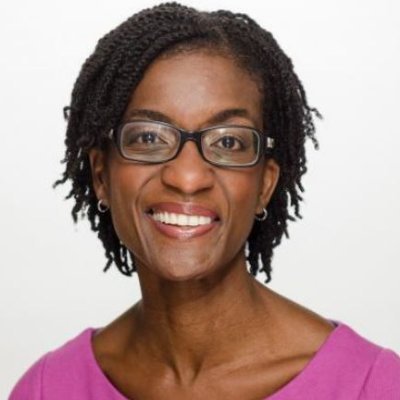Pathway to Feinberg: Muriel Jean-Jacques, MD

"Leading the advancement for Health Equity"
Muriel Jean-Jacques, MD has held numerous roles within the Feinberg community, including Associate Professor in the Division of General Internal Medicine, Associate Vice Chair for Diversity, Equity, and Inclusion for the Department of Medicine, and Co-Chair of the Quality Equity Committee for Northwestern Medicine during the first three years of the COVID-19 pandemic and its aftermath. Over her 16 years as a faculty member at the Feinberg School of Medicine, she has championed health equity through research, medical education, institutional leadership, and clinical care. As a health services researcher, she has designed and evaluated interventions aimed at reducing health disparities on local, regional, and national levels. In her role as a medical educator, she led the curricular overhaul of the Health Equity and Advocacy Thread, equipping students with the skills needed to provide equitable care throughout their careers.
Inspiration for a career in Medicine:
She has always been aware of the connection between people's social experiences and their access to healthcare. Growing up with immigrant parents from Haiti, she witnessed firsthand the disparities in healthcare access. Her father's work as an infectious disease specialist in safety net hospitals on the South and West sides of Chicago exposed her to the stark differences in medical care based on social and economic factors. This disparity fascinated her and fueled her desire to pursue a career in medicine. “Particularly, you know, seeing a close family member who died from something completely treatable because they didn’t have access to treatment—it’s impactful,” Jean-Jacques expresses.
Memorable experience at Feinberg:
Several memorable experiences stand out, but one that is particularly memorable occurred after the tragic murder of George Floyd. The leadership in their Department of Medicine sought ways to facilitate discussions on race within their community and address the nation's history and current challenges. They organized a special grand rounds session, inviting various department members to share their experiences with race. The panel included a white man, a woman of color, and Jean-Jacques herself. The level of thoughtfulness and preparation put into this event was remarkable.
Despite the demands of the pandemic, over 300 people logged in to watch and participate. It was truly impressive to see colleagues engage in open dialogue about race during such a critical time. This experience made her realize the bravery and allyship within their community. It was a powerful moment that reinforced her appreciation for her colleagues.
Advice for Younger Mentees:
“The biggest piece of advice I would give is to remember that time is on your side. Not everything needs to happen all at once. This is particularly relevant when navigating the pre-medical track, where there's often a sense of urgency to meet specific deadlines and milestones. While it's essential to fulfill those requirements, it's equally important to remember that you can still live your life alongside pursuing your goals.
Many of us have been conditioned to believe that achieving success requires immense sacrifice and relentless dedication. While hard work and sacrifice are undoubtedly part of the equation, it's crucial to recognize that life is multifaceted. You have the time and capacity to nurture your personal relationships and pursue your passions alongside your academic and career aspirations. Finding a balance between these different aspects of your life is key to long-term fulfillment and success.”
Staying Informed:
Staying informed for Jean-Jacques involves navigating various layers of information. During her commute, she often finds herself flipping through medical journals and scanning article summaries to remain current with ongoing research.
Staying informed also means staying attuned to the news cycle. She makes sure to catch up on the latest articles and trending topics, as this directly impacts her patients' beliefs and perceptions of health. While she tries to focus on reputable sources like JAMA and the New England Journal of Medicine, she also relies on curated lists from organizations like the Association of American Medical Colleges.
The Importance of Diversity & Inclusion:
This question is both timely and crucial, particularly given the current societal climate where diversity, inclusion, and equity are sometimes misconstrued or misrepresented. “Diversity is what makes us great as humans; we all have different talents, skills, personalities, and backgrounds, whether it's cultural, racial, economic, or based on our experiences.” She firmly believes in prioritizing inclusion, which goes beyond mere presence. It means feeling valued, respected, and empowered to contribute meaningfully. Inclusion ensures that every individual has a voice, space, and influence in society.
She also emphasizes the importance of equity. While equality focuses on equal rights and opportunities for all, equity recognizes that not everyone starts from the same place or has access to the same resources. Acknowledging and addressing these disparities is essential for ensuring that everyone has the opportunity to realize their full potential.
In healthcare, for example, a diverse workforce can offer invaluable insights and support tailored to individuals' unique needs and backgrounds. Access to diverse perspectives can profoundly impact health outcomes, giving patients the support they need to navigate health challenges successfully. “Diversity, inclusion, and equity are not just buzzwords; they are fundamental principles that contribute to a more just and compassionate society.” By embracing and prioritizing these principles, we can create a world where everyone feels valued, respected, and empowered to thrive.